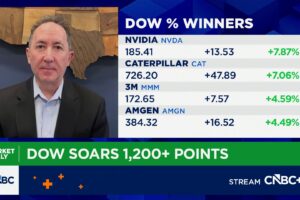
These stocks are high-quality picks even after the technology boom of 2024.
The U.S. stock market has demonstrated a strong performance in 2024, with the benchmark S&P 500 posting a total return of about 25% as the year nears its end. Not surprisingly, the technology sector, especially artificial intelligence (AI) powered stocks, has been at the heart of this bull rally.
There has been some increase in market volatility in December 2024 due to the Federal Reserve’s indication of fewer-than-expected interest rate cuts in 2025. Despite these headwinds, there are some high-quality, fundamentally strong stocks to watch out for in 2025.
Against this backdrop, these stocks can prove to be compelling picks for astute investors in 2025. Here’s why.
Nvidia
Nvidia (NVDA -2.09%) has emerged as a standout stock in 2024, demonstrating exceptional financial performance and technological prowess. It is indisputable that the company’s AI-optimized ecosystem (hardware, software, partners) has been at the heart of this dramatic growth trajectory.
Nvidia’s revenue soared by a solid 94% year over year to $35.1 billion in the third quarter of its fiscal 2025 (ended Oct. 27), driven mainly by 112% year-over-year growth of the AI-focused data center segment.
The top-line growth trajectory may continue for several quarters, thanks to the staggering demand for the company’s full-stack, full-infrastructure, and highly customizable AI data center scale Blackwell systems. The company has already shipped 13,000 samples of its next-generation Blackwell systems to customers including ChatGPT developer OpenAI.
After dominating the AI training market, Nvidia now stands to benefit dramatically from the growing demand in the inference market (deploying complex AI models in the production environment) due to its large installed base and robust software ecosystem. The company has successfully transitioned its hardware chips and software from training to inferencing workloads — implying that existing customers will not have to switch to competition.
Nvidia’s enterprise AI software solutions are also being increasingly adopted by prominent companies such as Salesforce, SAP, and ServiceNow. All these trends have helped to strengthen Nvidia’s moat further. Considering Nvidia’s diverse growth catalysts in the AI market and the excellent financial growth prospects, the company is well-positioned to deliver solid returns in 2025.
Advanced Micro Devices
Being the second-most prominent AI chip maker globally, Advanced Micro Devices (AMD 0.10%) is all set to benefit significantly in the rapidly expanding AI market (with a target addressable market estimated to be worth $500 billion by 2028).
The company’s data center revenue soared by 122% year over year to $3.5 billion in the third quarter, driven mainly by solid uptake of its Instinct GPUs and EPYC server CPUs. AMD now expects data center GPU revenue to be over $5 billion in 2024, an upgraded estimate from the previous $4.5 billion guidance provided in July 2024. Hence, although it’s behind Nvidia, AMD is steadily expanding its presence in the AI market.
Microsoft uses AMD’s MI300X chips to power multiple copilot services. Meta Platforms has also chosen these chips to power its inferencing infrastructure at scale, especially for its most demanding open-source Llama model. AMD is also focusing on performance improvements to further boost adoption of its GPUs.
The recently launched MI325X GPUs have demonstrated 20% better inferencing performance than H200 chips. AMD is also gearing up for the launch of the upcoming MI350-series GPUs scheduled in the second half of 2025.
Looking ahead to 2025, analysts expect AMD’s revenue to be around $32.56 billion, implying year-over-year growth of 26.88%. Plus, the company is profitable and free-cash-flow positive. Hence, AMD may be a worthwhile stock to watch out for in 2025.
Alphabet
Alphabet (GOOG -1.55%) (GOOGL -1.45%) has emerged as a formidable player in the AI space and is already earning money from its AI offerings. Although the company faces multiple headwinds, including antitrust challenges and adverse Department of Justice rulings (including a recent one wanting divestiture of its Chrome browser and Android mobile operating system), Alphabet’s fundamentals are pretty strong.
Google is still a leader in the global search market with an 89.9% share. Furthermore, the company has introduced AI Overview features in Search across 100 new countries and territories that will reach over a billion users every month.
This translates into increased frequency and complexity of search queries — which means more user engagement for the company’s search business. Google Search revenue was up 12% year over year to $49.4 billion and represented 57% of the company’s total revenue in the third quarter.
Google Cloud is also becoming a major catalyst, with revenue growing an impressive 35% year over year to $11.4 billion and operating income soaring by nearly 631% year over year to $1.9 billion in the third quarter. Robust adoption of AI infrastructure and generative AI technologies across industries and use cases has played a pivotal role in Google Cloud’s growth.
Hence, Alphabet looks like an attractive pick based on market leadership in the AI-powered search market and growth prospects in the cloud business.
Suzanne Frey, an executive at Alphabet, is a member of The Motley Fool’s board of directors. Randi Zuckerberg, a former director of market development and spokeswoman for Facebook and sister to Meta Platforms CEO Mark Zuckerberg, is a member of The Motley Fool’s board of directors. Manali Pradhan has no position in any of the stocks mentioned. The Motley Fool has positions in and recommends Advanced Micro Devices, Alphabet, Meta Platforms, Microsoft, Nvidia, Salesforce, and ServiceNow. The Motley Fool recommends the following options: long January 2026 $395 calls on Microsoft and short January 2026 $405 calls on Microsoft. The Motley Fool has a disclosure policy.









